A significant shift is looming in the way American citizens will be allowed to enter a large majority of European nations. The European Travel Information and Authorization System (ETIAS), an arm of the European Union, has unveiled its plans to implement a system in Spring 2025, requiring Americans to secure prior approval for travels up to 90 days in any of the 30 EU countries.
This is a departure from the current practice where US travelers enjoy effortless entry into these countries without a visa requirement. However, the new regulation will insist on individuals proceeding with their travels only after registering their intent via the official ETIAS website or mobile application, both of which currently do not process such requests.
In a radical departure from the norm, from 2025 onwards, American passport holders will no longer receive passport stamps. Alarmingly, the planned regulatory changes involve intense intrusions into personal privacy. The new rules state that visitors will be subjected to both face and fingerprint scans aside from surrendering other biometric data. It’s disconcerting that this data will be reserved within the European Commission’s Common Identity Repository (CIR), a database accessed by numerous agencies, including law enforcement.
The implications of this regulation change could be even more disconcerting from a privacy perspective. Critics and advocates of digital privacy have sounded the alarm on not just the possible misuse of this extensive data pool by governments, but also the potential exposure to hacking threats, be they criminal outfits or invasive foreign governments. There’s also the risk of rogue insiders dealing with this sensitive information.
These regulations reflect a worrying escalation towards a surveillance state that doesn’t differentiate between law-abiding citizens and potential threats but treats them both as data sets to be tagged, traced, and retained.
It’s worth noting that the US began collecting fingerprints of international tourists as part of the US-VISIT (United States Visitor and Immigrant Status Indicator Technology) program, which was initiated in 2004.



The status quo is a bit bizarre.
Currently if you are an EU citizen entering the EU, your face gets scanned. This /appears/ to be a cost saving measure because it bypasses the check at the manned desk. The passport goes on the scanner and you must face a camera and pose for a portrait. If everything checks out, the automatic doors open. Non-EU people entering the EU stand in a line to talk to border control staff, but no pics are taken. So non-EU people have a bit more privacy when entering.
that’s my same experience returning to the States after flying overseas.